- Home
- L. M. Montgomery
Rilla of Ingleside Page 7
Rilla of Ingleside Read online
Page 7
CHAPTER VII
A WAR-BABY AND A SOUP TUREEN
"Liege and Namur--and now Brussels!" The doctor shook his head. "Idon't like it--I don't like it."
"Do not you lose heart, Dr. dear; they were just defended byforeigners," said Susan superbly. "Wait you till the Germans comeagainst the British; there will be a very different story to tell andthat you may tie to."
The doctor shook his head again, but a little less gravely; perhapsthey all shared subconsciously in Susan's belief that "the thin greyline" was unbreakable, even by the victorious rush of Germany's readymillions. At any rate, when the terrible day came--the first of manyterrible days--with the news that the British army was driven back theystared at each other in blank dismay.
"It--it can't be true," gasped Nan, taking a brief refuge in temporaryincredulity.
"I felt that there was to be bad news today," said Susan, "for thatcat-creature turned into Mr. Hyde this morning without rhyme or reasonfor it, and that was no good omen."
"'A broken, a beaten, but not a demoralized, army,'" muttered thedoctor, from a London dispatch. "Can it be England's army of which sucha thing is said?"
"It will be a long time now before the war is ended," said Mrs. Blythedespairingly.
Susan's faith, which had for a moment been temporarily submerged, nowreappeared triumphantly.
"Remember, Mrs. Dr. dear, that the British army is not the Britishnavy. Never forget that. And the Russians are on their way, too, thoughRussians are people I do not know much about and consequently will nottie to."
"The Russians will not be in time to save Paris," said Walter gloomily."Paris is the heart of France--and the road to it is open. Oh, Iwish"--he stopped abruptly and went out.
After a paralysed day the Ingleside folk found it was possible to"carry on" even in the face of ever-darkening bad news. Susan workedfiercely in her kitchen, the doctor went out on his round of visits,Nan and Di returned to their Red Cross activities; Mrs. Blythe went toCharlottetown to attend a Red Cross Convention; Rilla after relievingher feelings by a stormy fit of tears in Rainbow Valley and an outburstin her diary, remembered that she had elected to be brave and heroic.And, she thought, it really was heroic to volunteer to drive about theGlen and Four Winds one day, collecting promised Red Cross supplieswith Abner Crawford's old grey horse. One of the Ingleside horses waslame and the doctor needed the other, so there was nothing for it butthe Crawford nag, a placid, unhasting, thick-skinned creature with anamiable habit of stopping every few yards to kick a fly off one legwith the foot of the other. Rilla felt that this, coupled with the factthat the Germans were only fifty miles from Paris, was hardly to beendured. But she started off gallantly on an errand fraught withamazing results.
Late in the afternoon she found herself, with a buggy full of parcels,at the entrance to a grassy, deep-rutted lane leading to the harbourshore, wondering whether it was worth while to call down at theAnderson house. The Andersons were desperately poor and it was notlikely Mrs. Anderson had anything to give. On the other hand, herhusband, who was an Englishman by birth and who had been working inKingsport when the war broke out, had promptly sailed for England toenlist there, without, it may be said, coming home or sending much hardcash to represent him. So possibly Mrs. Anderson might feel hurt if shewere overlooked. Rilla decided to call. There were times afterwardswhen she wished she hadn't, but in the long run she was very thankfulthat she did.
The Anderson house was a small and tumbledown affair, crouching in agrove of battered spruces near the shore as if rather ashamed of itselfand anxious to hide. Rilla tied her grey nag to the rickety fence andwent to the door. It was open; and the sight she saw bereft hertemporarily of the power of speech or motion.
Through the open door of the small bedroom opposite her, Rilla saw Mrs.Anderson lying on the untidy bed; and Mrs. Anderson was dead. There wasno doubt of that; neither was there any doubt that the big, frowzy,red-headed, red-faced, over-fat woman sitting near the door-way,smoking a pipe quite comfortably, was very much alive. She rocked idlyback and forth amid her surroundings of squalid disorder, and paid noattention whatever to the piercing wails proceeding from a cradle inthe middle of the room.
Rilla knew the woman by sight and reputation. Her name was Mrs.Conover; she lived down at the fishing village; she was a great-aunt ofMrs. Anderson; and she drank as well as smoked.
Rilla's first impulse was to turn and flee. But that would never do.Perhaps this woman, repulsive as she was, needed help--though shecertainly did not look as if she were worrying over the lack of it.
"Come in," said Mrs. Conover, removing her pipe and staring at Rillawith her little, rat-like eyes.
"Is--is Mrs. Anderson really dead?" asked Rilla timidly, as she steppedover the sill.
"Dead as a door nail," responded Mrs. Conover cheerfully. "Kicked thebucket half an hour ago. I've sent Jen Conover to 'phone for theundertaker and get some help up from the shore. You're the doctor'smiss, ain't ye? Have a cheer?"
Rilla did not see any chair which was not cluttered with something. Sheremained standing.
"Wasn't it--very sudden?"
"Well, she's been a-pining ever since that worthless Jim lit out forEngland--which I say it's a pity as he ever left. It's my belief shewas took for death when she heard the news. That young un there wasborn a fortnight ago and since then she's just gone down and today sheup and died, without a soul expecting it."
"Is there anything I can do to--to help?" hesitated Rilla.
"Bless yez, no--unless ye've a knack with kids. I haven't. That youngun there never lets up squalling, day or night. I've just got that Itake no notice of it."
Rilla tiptoed gingerly over to the cradle and more gingerly stillpulled down the dirty blanket. She had no intention of touching thebaby--she had no "knack with kids" either. She saw an ugly midget witha red, distorted little face, rolled up in a piece of dingy oldflannel. She had never seen an uglier baby. Yet a feeling of pity forthe desolate, orphaned mite which had "come out of the everywhere" intosuch a dubious "here", took sudden possession of her.
"What is going to become of the baby?" she asked.
"Lord knows," said Mrs. Conover candidly. "Min worried awful over thatbefore she died. She kept on a-saying 'Oh, what will become of my porebaby' till it really got on my nerves. I ain't a-going to troublemyself with it, I can tell yez. I brung up a boy that my sister leftand he skinned out as soon as he got to be some good and won't give mea mite o' help in my old age, ungrateful whelp as he is. I told Minit'd have to be sent to an orphan asylum till we'd see if Jim ever cameback to look after it. Would yez believe it, she didn't relish theidee. But that's the long and short of it."
"But who will look after it until it can be taken to the asylum?"persisted Rilla. Somehow the baby's fate worried her.
"S'pose I'll have to," grunted Mrs. Conover. She put away her pipe andtook an unblushing swig from a black bottle she produced from a shelfnear her. "It's my opinion the kid won't live long. It's sickly. Minnever had no gimp and I guess it hain't either. Likely it won't troubleany one long and good riddance, sez I."
Rilla drew the blanket down a little farther.
"Why, the baby isn't dressed!" she exclaimed, in a shocked tone.
"Who was to dress him I'd like to know," demanded Mrs. Conovertruculently. "I hadn't time--took me all the time there was lookingafter Min. 'Sides, as I told yez, I don't know nithing about kids. OldMrs. Billy Crawford, she was here when it was born and she washed itand rolled it up in that flannel, and Jen she's tended it a bit since.The critter is warm enough. This weather would melt a brass monkey."
Rilla was silent, looking down at the crying baby. She had neverencountered any of the tragedies of life before and this one smote herto the core of her heart. The thought of the poor mother going downinto the valley of the shadow alone, fretting about her baby, with noone near but this abominable old woman, hurt her terribly. If she hadonly come a little sooner! Yet what could she have done--what could shedo now? She
didn't know, but she must do something. She hatedbabies--but she simply could not go away and leave that poor littlecreature with Mrs. Conover--who was applying herself again to her blackbottle and would probably be helplessly drunk before anybody came.
"I can't stay," thought Rilla. "Mr. Crawford said I must be home bysupper-time because he wanted the pony this evening himself. Oh, whatcan I do?"
She made a sudden, desperate, impulsive resolution.
"I'll take the baby home with me," she said. "Can I?"
"Sure, if yez wants to," said Mrs. Conover amiably. "I hain't anyobjection. Take it and welcome."
"I--I can't carry it," said Rilla. "I have to drive the horse and I'dbe afraid I'd drop it. Is there a--a basket anywhere that I could putit in?"
"Not as I knows on. There ain't much here of anything, I kin tell yez.Min was pore and as shiftless as Jim. Ef ye opens that drawer overthere yez'll find a few baby clo'es. Best take them along."
Rilla got the clothes--the cheap, sleazy garments the poor mother hadmade ready as best she could. But this did not solve the pressingproblem of the baby's transportation. Rilla looked helplessly round.Oh, for mother--or Susan! Her eyes fell on an enormous blue soup tureenat the back of the dresser.
"May I have this to--to lay him in?" she asked.
"Well, 'tain't mine but I guess yez kin take it. Don't smash it if yezcan help--Jim might make a fuss about it if he comes back alive--whichhe sure will, seein' he ain't any good. He brung that old tureen outfrom England with him--said it'd always been in the family. Him and Minnever used it--never had enough soup to put in it--but Jim thought theworld of it. He was mighty perticuler about some things but didn'tworry him none that there weren't much in the way o' eatables to put inthe dishes."
For the first time in her life Rilla Blythe touched a baby--liftedit--rolled it in a blanket, trembling with nervousness lest she drop itor--or--break it. Then she put it in the soup tureen.
"Is there any fear of it smothering?" she asked anxiously.
"Not much odds if it do," said Mrs. Conover.
Horrified Rilla loosened the blanket round the baby's face a little.The mite had stopped crying and was blinking up at her. It had big darkeyes in its ugly little face.
"Better not let the wind blow on it," admonished Mrs. Conover. "Takeits breath if it do."
Rilla wrapped the tattered little quilt around the soup tureen.
"Will you hand this to me after I get into the buggy, please?"
"Sure I will," said Mrs. Conover, getting up with a grunt.
And so it was that Rilla Blythe, who had driven to the Anderson house aself-confessed hater of babies, drove away from it carrying one in asoup tureen on her lap!
Rilla thought she would never get to Ingleside. In the soup tureenthere was an uncanny silence. In one way she was thankful the baby didnot cry but she wished it would give an occasional squeak to prove thatit was alive. Suppose it were smothered! Rilla dared not unwrap it tosee, lest the wind, which was now blowing a hurricane, should "take itsbreath," whatever dreadful thing that might be. She was a thankful girlwhen at last she reached harbour at Ingleside.
Rilla carried the soup tureen to the kitchen, and set it on the tableunder Susan's eyes. Susan looked into the tureen and for once in herlife was so completely floored that she had not a word to say.
"What in the world is this?" asked the doctor, coming in.
Rilla poured out her story. "I just had to bring it, father," sheconcluded. "I couldn't leave it there."
"What are you going to do with it?" asked the doctor coolly.
Rilla hadn't exactly expected this kind of question.
"We--we can keep it here for awhile--can't we--until something can bearranged?" she stammered confusedly.
Dr. Blythe walked up and down the kitchen for a moment or two while thebaby stared at the white walls of the soup tureen and Susan showedsigns of returning animation.
Presently the doctor confronted Rilla.
"A young baby means a great deal of additional work and trouble in ahousehold, Rilla. Nan and Di are leaving for Redmond next week andneither your mother nor Susan is able to assume so much extra careunder present conditions. If you want to keep that baby here you mustattend to it yourself."
"Me!" Rilla was dismayed into being ungrammatical. "Why--father--I--Icouldn't!"
"Younger girls than you have had to look after babies. My advice andSusan's is at your disposal. If you cannot, then the baby must go backto Meg Conover. Its lease of life will be short if it does for it isevident that it is a delicate child and requires particular care. Idoubt if it would survive even if sent to an orphans' home. But Icannot have your mother and Susan over-taxed."
The doctor walked out of the kitchen, looking very stern and immovable.In his heart he knew quite well that the small inhabitant of the bigsoup tureen would remain at Ingleside, but he meant to see if Rillacould not be induced to rise to the occasion.
Rilla sat looking blankly at the baby. It was absurd to think she couldtake care of it. But--that poor little, frail, dead mother who hadworried about it--that dreadful old Meg Conover.
"Susan, what must be done for a baby?" she asked dolefully.
"You must keep it warm and dry and wash it every day, and be sure thewater is neither too hot nor too cold, and feed it every two hours. Ifit has colic, you put hot things on its stomach," said Susan, ratherfeebly and flatly for her.
The baby began to cry again.
"It must be hungry--it has to be fed anyhow," said Rilla desperately."Tell me what to get for it, Susan, and I'll get it."
Under Susan's directions a ration of milk and water was prepared, and abottle obtained from the doctor's office. Then Rilla lifted the babyout of the soup tureen and fed it. She brought down the old basket ofher own infancy from the attic and laid the now sleeping baby in it.She put the soup tureen away in the pantry. Then she sat down to thinkthings over.
The result of her thinking things over was that she went to Susan whenthe baby woke.
"I'm going to see what I can do, Susan. I can't let that poor littlething go back to Mrs. Conover. Tell me how to wash and dress it."
Under Susan's supervision Rilla bathed the baby. Susan dared not help,other than by suggestion, for the doctor was in the living-room andmight pop in at any moment. Susan had learned by experience that whenDr. Blythe put his foot down and said a thing must be, that thing was.Rilla set her teeth and went ahead. In the name of goodness, how manywrinkles and kinks did a baby have? Why, there wasn't enough of it totake hold of. Oh, suppose she let it slip into the water--it was sowobbly! If it would only stop howling like that! How could such a tinymorsel make such an enormous noise. Its shrieks could be heard overIngleside from cellar to attic.
"Am I really hurting it much, Susan, do you suppose?" she askedpiteously.
"No, dearie. Most new babies hate like poison to be washed. You arereal knacky for a beginner. Keep your hand under its back, whatever youdo, and keep cool."
Keep cool! Rilla was oozing perspiration at every pore. When the babywas dried and dressed and temporarily quieted with another bottle shewas as limp as a rag.
"What must I do with it tonight, Susan?"
A baby by day was dreadful enough; a baby by night was unthinkable.
"Set the basket on a chair by your bed and keep it covered. You willhave to feed it once or twice in the night, so you would better takethe oil heater upstairs. If you cannot manage it call me and I will go,doctor or no doctor."
"But, Susan, if it cries?"
The baby, however, did not cry. It was surprisingly good--perhapsbecause its poor little stomach was filled with proper food. It sleptmost of the night but Rilla did not. She was afraid to go to sleep forfear something would happen to the baby. She prepared its three o'clockration with a grim determination that she would not call Susan. Oh, wasshe dreaming? Was it really she, Rilla Blythe, who had got into thisabsurd predicament? She did not care if the Germans were nearParis--she did not care if they we
re in Paris--if only the babywouldn't cry or choke or smother or have convulsions. Babies did haveconvulsions, didn't they? Oh, why had she forgotten to ask Susan whatshe must do if the baby had convulsions? She reflected rather bitterlythat father was very considerate of mother's and Susan's health, butwhat about hers? Did he think she could continue to exist if she nevergot any sleep? But she was not going to back down now--not she. Shewould look after this detestable little animal if it killed her. Shewould get a book on baby hygiene and be beholden to nobody. She wouldnever go to father for advice--she wouldn't bother mother--and shewould only condescend to Susan in dire extremity. They would all see!
Thus it came about that Mrs. Blythe, when she returned home two nightslater and asked Susan where Rilla was, was electrified by Susan'scomposed reply.
"She's upstairs, Mrs. Dr. dear, putting her baby to bed."

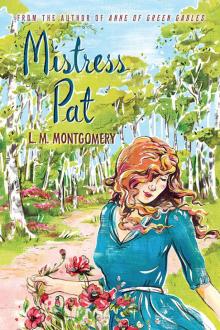 Mistress Pat
Mistress Pat A Tangled Web
A Tangled Web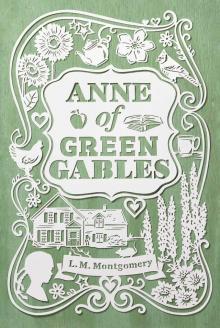 Anne of Green Gables
Anne of Green Gables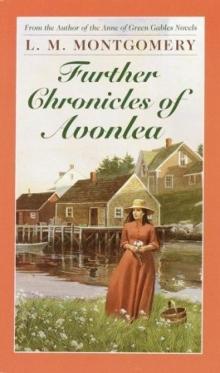 Further Chronicles of Avonlea
Further Chronicles of Avonlea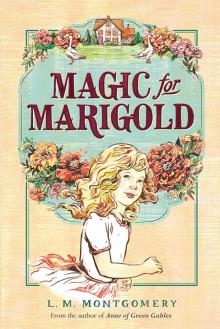 Magic for Marigold
Magic for Marigold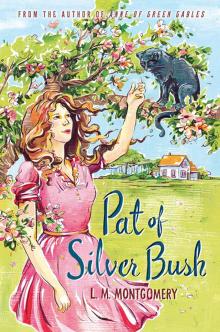 Pat of Silver Bush
Pat of Silver Bush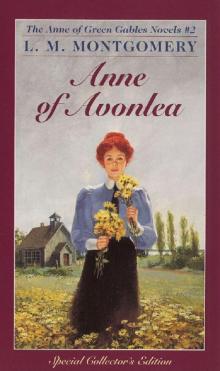 Anne of Avonlea
Anne of Avonlea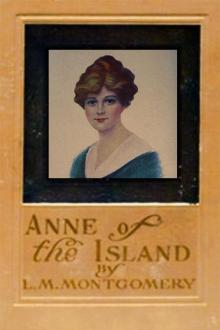 Anne of the Island
Anne of the Island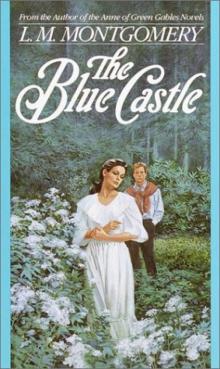 The Blue Castle
The Blue Castle The Blythes Are Quoted
The Blythes Are Quoted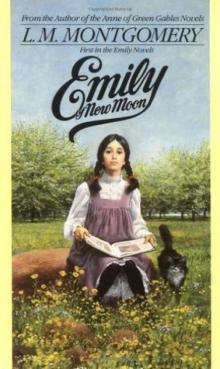 Emily of New Moon
Emily of New Moon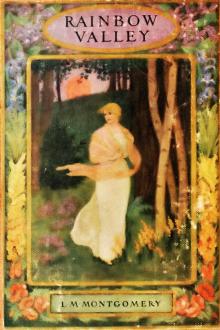 Rainbow Valley
Rainbow Valley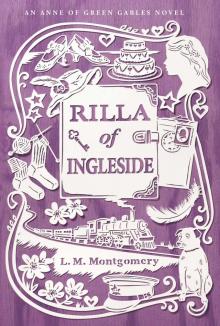 Rilla of Ingleside
Rilla of Ingleside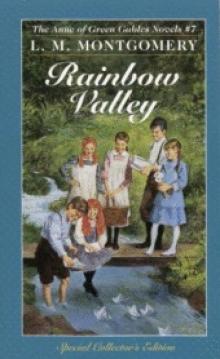 07 - Rainbow Valley
07 - Rainbow Valley Anne of Green Gables (Penguin)
Anne of Green Gables (Penguin) Emily Climbs
Emily Climbs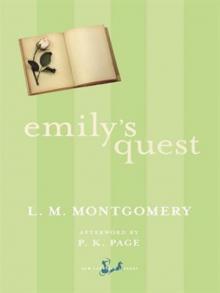 Emily's Quest
Emily's Quest A Name for Herself
A Name for Herself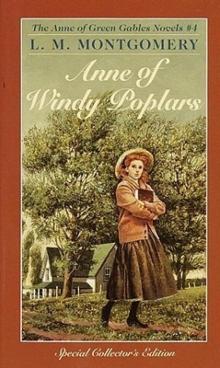 Anne of Windy Poplars
Anne of Windy Poplars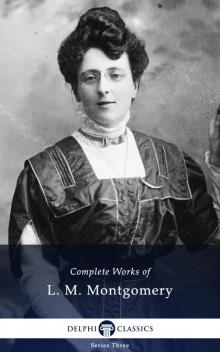 The Complete Works of L M Montgomery
The Complete Works of L M Montgomery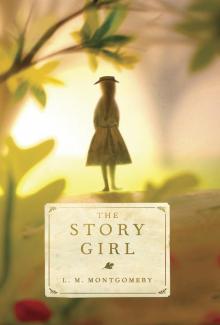 The Story Girl
The Story Girl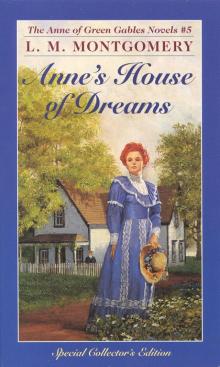 Anne's House of Dreams
Anne's House of Dreams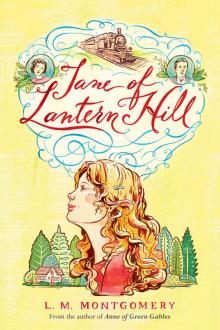 Jane of Lantern Hill
Jane of Lantern Hill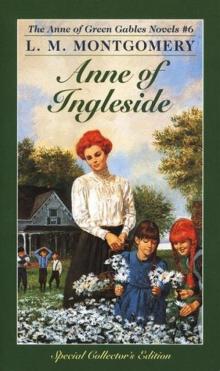 Anne of Ingleside
Anne of Ingleside